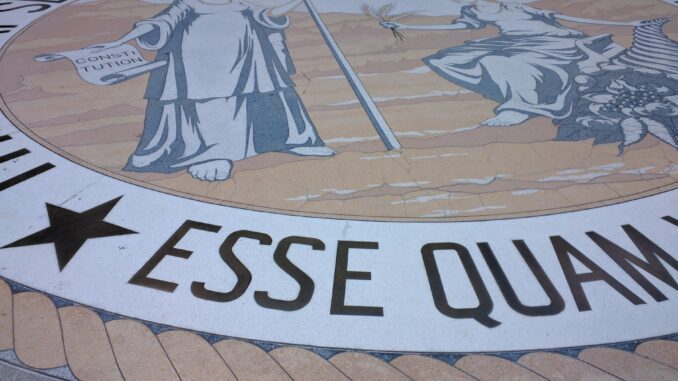
RALEIGH — Election law changes from previous bills are being revived according to a June 1 joint press release by Sens. Ralph Hise (R-Mitchell), Paul Newton (R-Cabarrus) and Warren Daniel (R-Burke).
The three lawmakers are co-chairs of the Senate Redistricting and Elections Committee and are the primary sponsors of Senate Bill 747, which they say “will strengthen election laws, increase confidence in election administration, and align North Carolina with 30 other states by establishing Election Day as the firm deadline for accepting absentee ballots.”
The joint press release cited two polls: a 2021 Cygnal poll showing only 49% of North Carolinians believed the 2022 elections would be “free and fair,” and a May 2023 Cygnal poll that found only 50% of North Carolinians believe our elections will be free and fair.
“We cannot afford to do nothing in the face of low voter confidence,” Hise said in the joint statement. “This bill builds on popular legislation that Gov. (Roy) Cooper vetoed and makes key changes that we believe will assist our elections officials and modernize the administration of elections in North Carolina.”
The bill includes provisions from bills previously vetoed by Cooper, a Democrat. One provision will make Election Day the final deadline for accepting absentee mail-in ballots.
Cooper was quick to complain on Twitter, writing “And here they go with advice from election deniers and fraud perpetrators. Don’t be fooled. This isn’t about protecting elections. It’s about rigging them to help Republicans.” The tweet was signed “-RC,” denoting the governor wrote the tweet himself.
According to the National Conference of State Legislatures, 30 other states use Election Day as the deadline for absentee mail-in ballot submissions.
“Making Election Day the official deadline removes confusion and skepticism from the minds of voters,” Newton said in the press release. “It will make for a quicker declaration of winners, it aligns us with 30 other states, and it helps North Carolina move past each election cycle with confidence, instead of doubt.”
In 2021, Cooper vetoed a bill with similar provisions; Senate Bill 326, The Election Day Integrity Act.
The bill would also require the N.C. State Board of Elections (NCSBE) to create a two-factor authentication process for absentee ballots cast by mail.
Additionally, absentee ballots will have a line for both a signature and printed name for both the voter and the witness, and the state board of elections will require county boards to use verification software to check those signatures.
Another provision would bar state and county boards of election from accepting outside funds.
“The injection of hundreds of millions of private dollars into the U.S. elections was rightfully scrutinized by many Americans,” Daniel said. “By putting an end to out-of-state billionaires bankrolling the administration of our elections, we will maintain election integrity and steer clear from the very notion of outside influence.”
Cooper also vetoed a bill in 2021 with the same goal; Senate Bill 725, titled Prohibit Private Money in Election Admin.
During the 2020 election cycle, Met CEO Mark Zuckerberg, through the Center for Tech and Civic Life (CLTC), funneled over $419 million to around 2,500 county boards of election in 49 states. The funds doled out by the CLTC became known as “Zuck Bucks.”
Thirty-five North Carolina counties received “Zuck Bucks” in 2020. The state overall received more than $5.395 million. The NCSBE and Wake County received a million each, and Durham received more than $1.46 million. Many of the areas receiving CLTC funds showed notable increases in Democrat voter turnout.
On top of the “Zuck Bucks,” $190,000 was spent across 10 boards of election in North Carolina that came from the Schwarzenegger Institute.
Senate Bill 747 will also require the clerk of superior court to notify the NCSBE of persons disqualified from jury duty due to being a non-U.S. citizen. The NCSBE will review the report and direct county boards of elections to eliminate noncitizens from the voter rolls.
Public inspection of absentee ballots at the weekly county boards of elections meetings authorized through Election Day is included in the measure, as is increasing record retention rates to 22 months in order to match current federal requirements.
Under the bill, precinct officials will be required to log the name of any person that is assisting a voter.
The bill would require the NCSBE to report any revisions or changes to election records after certification to the Joint Legislative Elections Oversight Committee and the Joint Legislative Oversight Committee on General Government.
Another update in the bill says voters using same-day registration at an early, in-person voting site will be required to cast a provisional ballot that will only be accepted if the voter’s address can be verified on Election Day using mailing confirmation and the voter verification process that applies to all new voters.


